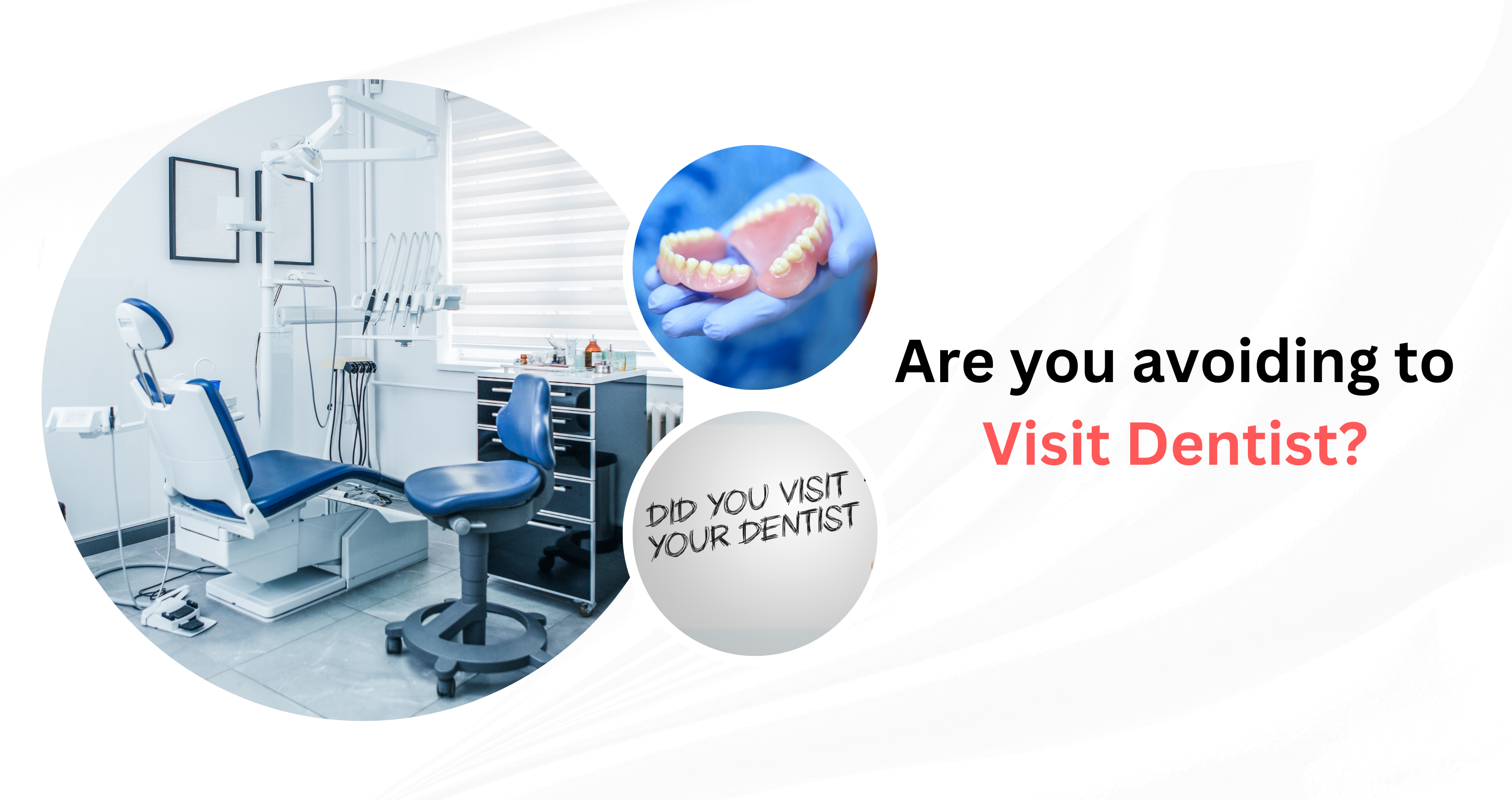
Are You Avoiding To Visit Your Dentist?
Are you avoiding the dentist due to fear or anxiety?
You may be having dental anxiety, a condition that is estimated to affect about 36% of the population, according to the National Library of Medicine.
Most people are today conscious of the importance of dental checks and their relation to other body systems in the body. However, even this knowledge does not make many of them go for routine dental checkups. They usually delay their visits until they cannot avoid seeking treatment as their pain or discomfort increases.
If you can identify with this, then you will find this blog helpful as it outlines the causes of dental anxiety, how to reduce dental anxiety before a dentist appointment and the role of sedation dentistry in reducing dental fear. You will also find out about the best dentist for anxious patients in India, how they calm their patients before treatment and about coping with dental phobia.
Understanding Dental anxiety and its Symptoms
Dental anxiety is a term used to describe a person’s fear or stress when considering a dental appointment. For some people, it could be the sight of needles, and for others – the sound of dental drills or even just being in the dental office may cause such feelings.
Sometimes, dental anxiety may progress into dental phobia when it becomes almost impossible for a person to go for treatment due to their fear. Even people with very mild pain and discomfort in their teeth can refuse or delay going to the dentist. Other factors that may predispose a person to dental anxiety include generalized anxiety disorder or a history of head or neck injury. Health issues like bipolar disorder or depression can complicate the treatment of anxiety of any kind, including when it comes to the dentist.

People with dental anxiety might show symptoms like:
- Sweating or extreme sweating
- Heart palpitations or racing heartbeat
- Crying or visible distress
- Restlessness or aggressive behavior
- Avoiding people or masking feelings by using humor
- Low blood pressure or fainting
Some people may not visit the dentist as often as they should or struggle to go through any dental process at all, simple or complicated.
How Dental Anxiety Affects Oral Health
Not visiting a dentist for things like routine examinations, check-ups, cleanings, and taking X-rays may result in major problems. Such visits enable dentists to identify problems at a time when they are easier to treat. But, avoiding them allows issues to worsen, which may need more severe intervention or even hospitalization. This can make dental anxiety even harder to overcome as the treatments become more complicated.
If you do not get professional cleanings, you are more likely to develop gum diseases, bleeding gums, loose teeth, and bad breath. Most dental diseases can be prevented and result from how we care for our teeth. By skipping visits to the dentist, you not only delay procedures but also miss the chance to learn how to maintain your oral health. Therefore, overcoming fear of dentists by learning the techniques to calm dental anxiety at the clinic is crucial as it is a key determinant of good oral health and general well-being.
Factors that Lead to Dental Anxiety and Phobia
Let us look at some of the common reasons for dental anxiety:
- Past Traumatic Experiences: Fear of dental treatment may be due to a previous bad experience with a dental visit.
- Head and Neck Trauma: Any injury to the head or neck region can increase fear when going for a dental appointment.
- Gag Reflex: There are some patients who have a very sensitive throat, and they feel like vomiting when instruments are inserted at the back of the throat. This can cause gagging or choking concerns and may become a problem for some patients to receive specific treatments.
- Mental Health Concerns: Conditions like anxiety, depression, or PTSD can make dental visits stressful.
- Fear of Pain: Worries about pain often stem from past negative experiences or hearing about similar cases.
- Embarrassment: Patients may avoid the dentist because they are self-conscious about their teeth, breath, or hygiene.
- Invasion of Personal Space: Some people are uneasy with someone probing around in their mouth, getting into their personal space.
- Fear of Anesthesia: Patients may worry about side effects like nausea, numbness, or dizziness, causing anxiety.
- Loss of Control: Lying back in the dentist’s chair without seeing or influencing the procedure can feel unsettling for some.
- Fear of Needles: The very idea of injections, let alone injections in the mouth, causes anxiety in many patients.
Who Gets Affected By Dental Phobia
Dental phobia can be present in people of all ages. Kids who had negative encounters previously can be encouraged to overcome their fears during their next dental visits. However, many adults carry their dental anxiety into adulthood, making it harder to manage. With proper care and understanding, both children and adults can find ways to ease their fear. It is important to know how to prepare for your first dentist visit with anxiety.
Tips for Managing Dental Phobia During Check-ups
Alleviating dental anxiety can be easy when you implement some simple methods to calm your nerves during dental checkups. Here are some helpful tips:
- Talk to Your Dentist: It is okay to discuss your concerns with your dentist. They can explain the procedure steps so that you are sure what to go through, thus helping with your anxiety. They may also recommend techniques such as listening to some calming music or applying numbing gels to make you more comfortable. Asking questions can also help you feel more in control.

2. Try Breathing Exercises: Deep breathing can assist the body in lowering stress and relaxing the nerves. Just shut your eyes, hold your breath for some time, and try to breathe in through your nose and then breathe out through your mouth. This should be repeated several times to help you lower your anxiety level.
3. Practice Meditation and Muscle Relaxation: Meditation is a good way to help your mind and body to rest. Before and during the appointment, you can spend time trying to relax each part of your body, beginning with the head and ending with the toes. Try to look at a calming object in the room to clear your mind.

4. Visualization: ’Try to picture a happy moment in life or any place that brings comfort. If you have positive images engraved in your mind, you will not have a chance to dwell too much on the dental procedure, making you feel calm.
5. Bring a Supportive Friend: Having a friend or a family member with you is also comforting. Since they are there with you, it can make you feel comfortable even if you cannot speak to them during the procedure.
6. General Anesthesia: General anesthesia is a deeper form of sedation during which the patient is not conscious at all during the surgical procedure. It is normally used for major dental operations and is given under the supervision of an anesthetist. The side effects include drowsiness or nausea, and it takes a little longer to recover than when under conscious sedation.
The Role of Sedation Dentistry in the Reducing Dental Fear
A dentist administers a drug through a drip in your arm or hand for conscious sedation, keeping you comfortable yet awake and able to follow directions during the procedure. It’s perfect for people with dental anxiety and can be administered in a dentist’s office and some hospitals. Possible complications include dizziness or mild nausea after the procedure is done.
Why It Is Important To Hire Experienced Dentists Such As Gnathos Dental
If you have dental phobia, it is important to select one of the best stress-free dental clinics in India that can treat such patients. A good dentist will always want to understand your concerns and will do everything possible to reduce your stress and phobia.
At Gnathos Dental, the dentists understand the plight of patients with dental phobia and help them calm down. Besides, they inform you about relaxation methods for dentist anxiety relief and t the types of anesthesia, including sedation or general anesthesia and then decide which one is the most appropriate for you. They use top-quality, ADA-compliant equipment and materials to ensure safety and excellent outcomes.
Conclusion
For those who have dental anxiety, it is necessary to find the best sedation dentistry India clinics that know How to reduce dental anxiety before a dentist appointment and understand the role of sedation dentistry in decreasing dental fear.
Don’t let dental anxiety prevent you from undergoing dental treatments. Visit our clinic for a comfortable and pleasant dental experience, and get personalized treatment plans based on your needs, whether wisdom tooth extraction or dental bridges.
FAQs
- What are the top tips for kids with dental anxiety?
To help kids manage dental anxiety, it is necessary to create a welcoming atmosphere with colorful decorations, use gentle, child-friendly communication, and provide distractions like TV, music, or toys during procedures.
- Who are the best dentists for anxious patients in India?
Patients with dental anxiety should choose experienced dentists like Gnathos Dental, who focus on comfort and provide tips to ease anxiety and fears.
- Can you give some tips for managing dental phobia during check-ups?
If you are anxious about your dental visit, you must try relaxation methods like deep breathing to calm your mind. Talk about your fears to your dentist, and if needed, bring along a relative or a friend to the clinic for support.
- Is sedation effective in reducing dental fear?
Yes, sedation can be effective in reducing dental fear by calming the nervous system and helping patients relax during procedures. It eases anxiety and makes treatments more comfortable.
